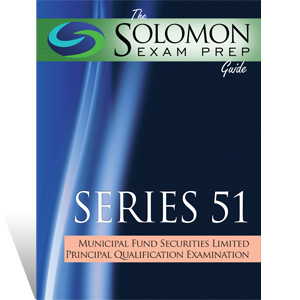Solomon Exam Prep announces publication of the 2nd edition of The Solomon Exam Prep Guide to the Series 51 Municipal Fund Securities Exam. Written in clear English with practice questions, exercises and visual aids sprinkled throughout, the comprehensive Solomon Exam Prep Guide will get you on track to passing the Series 51 Municipal Fund Securities Limited Principal exam. Continue reading
 Do you need to know about qualified tuition plans, arbitrage rules and LGIP tax-exempt status? Do SMMPs, OMSJs, and “otherwise independent persons” sound meaningful to you? If you answered yes to these questions, then you probably work in the municipal fund securities industry and you need to take the MSRB Series 51 exam.
Do you need to know about qualified tuition plans, arbitrage rules and LGIP tax-exempt status? Do SMMPs, OMSJs, and “otherwise independent persons” sound meaningful to you? If you answered yes to these questions, then you probably work in the municipal fund securities industry and you need to take the MSRB Series 51 exam.
Solomon Exam Prep announces publication of the 2nd edition of The Solomon Exam Prep Guide to the Series 51 Municipal Fund Securities Exam. Written in clear English with practice questions, exercises and visual aids sprinkled throughout, the comprehensive Solomon Exam Prep Guide will get you on track to passing the Series 51 Municipal Fund Securities Limited Principal exam.
According to Solomon Exam Prep President Jeremy Solomon, many underestimate the Series 51 exam because it’s only 60 questions long. Says Solomon: “The good thing about a shorter exam like the Series 51 is that it’s only 60 questions and it doesn’t cover as much material as other securities exams, such as the Series 7 or the Series 65. The bad thing about the Series 51 is that it’s only 60 questions and there’s less margin for error. What makes the Series 51 particularly challenging is that it covers topics that most individuals, even securities professionals, have little knowledge of: the supervision of municipal fund securities activities. Topics include LGIPs, arbitrage bonds, qualified tuition plans and the regulation of political contributions. That’s why a good text and putting in enough study time are absolutely necessary if you want to pass the Series 51 exam and achieve the Municipal Fund Limited Principal registration.”
The Solomon Exam Prep Guide to the Series 51 Exam, 2nd edition includes:
New and updated MSRB rules, per the latest MSRB exam outline
Expanded arbitrage rebate section
Discussion of A, B, and C shares and breakpoint sales in relation to 529 plans
Expanded sections on transferring funds from other savings vehicles into 529 plans
Expanded discussion of municipal fund securities principal responsibilities
Expanded discussion and examples of the pay-to-play rule
Expanded discussion of out-of-state disclosure rules for 529 plans
Updated suitability section based on new suitability rule and its application
More examples, tables, figures, exercises and practice questions
Solomon Exam Prep has helped thousands of financial professionals pass their FINRA, NASAA, and MSRB securities regulatory exams including the Series 6, 7, 24, 26, 27, 28, 51, 52, 53, 55, 62, 63, 65, 66, 79, 82, and 99. The Solomon Exam Prep training system includes print and digital Exam Study Guides, Online Exam Simulators, Audiobooks, and Video Lectures to address the learning needs of all kinds of test-takers.
Solomon Exam Prep is led by founders Jeremy and Karen Solomon, both of whom maintain a lifelong commitment to advancing learning and education. Solomon Exam Prep draws from a pool of seasoned educators, practitioners and communicators who are experienced in both investment education and the process of adult learning.






